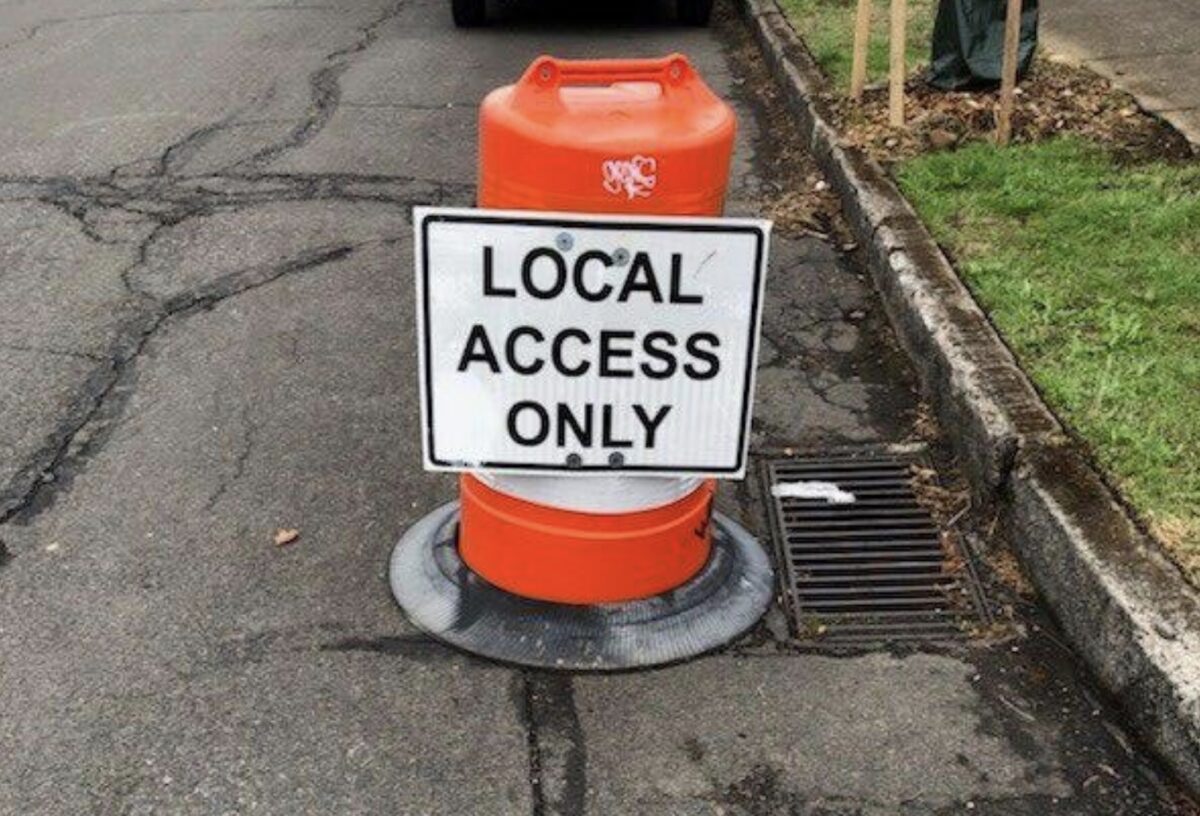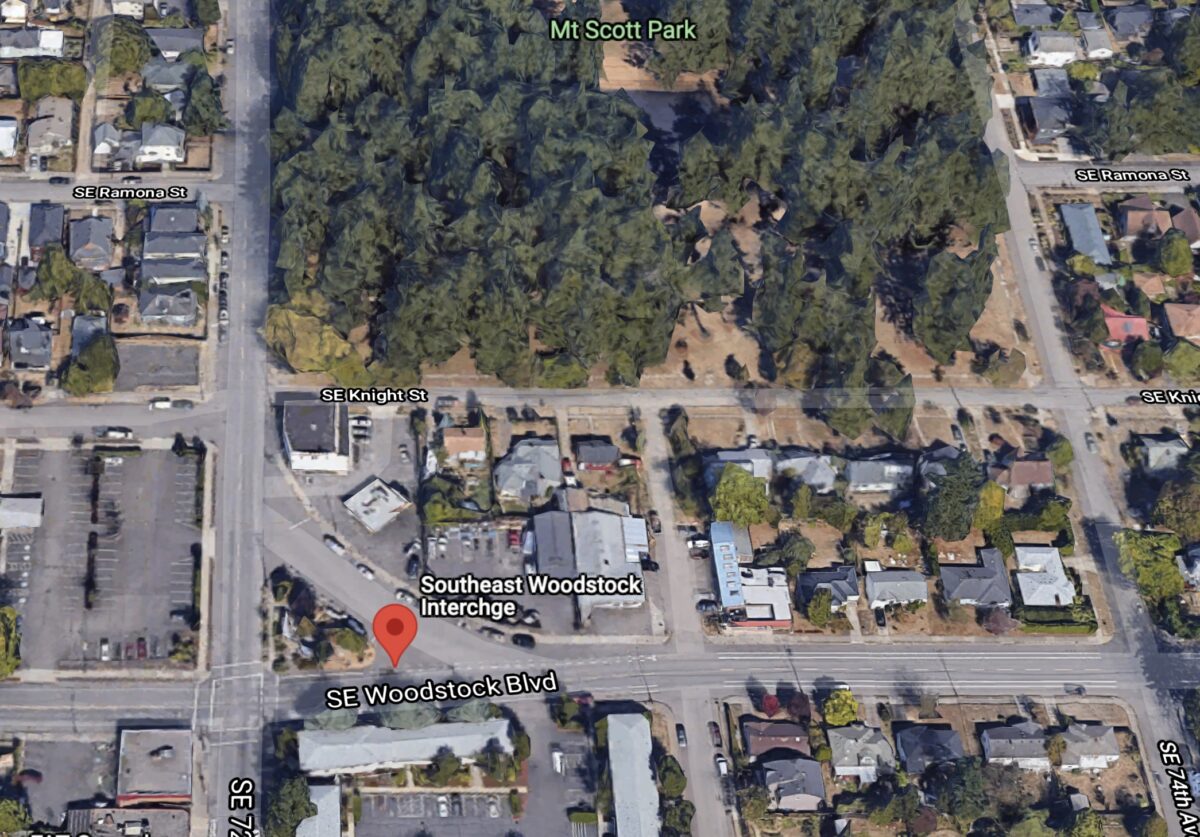
(Photo: Commissioner Hardesty’s office)
“The hope is that through traffic changes… we can slow down activity at these gun violence hot spots and make it more difficult to commit a crime and get away with it.”
— Jo Ann Hardesty, city commissioner
For many years, Portland’s problems of gun violence and traffic violence have operated on separate tracks. At times they have even been in conflict with each other. But finally, thanks to recent moves by Transportation Commissioner Jo Ann Hardesty, solutions to these complicated issues have found common ground.
Last week, Hardesty announced a notable collaboration with the Mt. Scott Arleta Neighborhood Association to curb a spate of shootings and ancillary traffic safety dangers. Residents worried that the vehicles used by gun users were just as dangerous to their community as the guns themselves. Hardesty’s response has been to implement traffic infrastructure and other public space changes. It’s a natural evolution of a holistic approach to neighborhood safety that Hardesty has been advocating for since at least a year ago when she injected the idea of public health instead of armed policing into the enforcement conversation.
Back in August, when violent extremists came to Portland to peddle a message of hate, we pointed out that Hardesty had a huge opportunity to use her oversight of streets to combat vehicle-based violence. She has now done that.
In Mt. Scott-Arleta, Hardesty has given the green light to install temporary traffic control devices that aim to calm traffic and tempers. “From police to community-based organizations to infrastructure design – we all have a role to play in this emergency,” Hardesty said in a statement. “I’m directing PBOT to be more active and engaged in holistic solutions to community safety that can supplement police and other bureaus’ roles in this effort.”
Advertisement

Calling it an “experimental pilot” that could be made more robust and permanent pending outcomes and fall budget negotiations at City Hall, PBOT has placed orange plastic traffic barrels with “Local Access Only” signs at several locations with a six-block area near Mt Scott park (SE Woodstock and 72nd), where shootings have even occurred in broad daylight. In total, 24 barrels will be placed in the street.
The list of ideas proposed by neighbors (backed up by recommendations from Dr. Jonathan Jay, a public health expert hired as a consultant by the City of Portland) include: more lighting; gating a large parking lot; banning drivers from the Woodstock Interchange, a slip lane at SE 72nd and Woodstock, and creating a public plaza to be designed in coordination with Better Block PSU; community art projects; and a reduced speed limit on 72nd Ave.
“The hope is that through traffic changes… we can slow down activity at these gun violence hot spots and make it more difficult to commit a crime and get away with it,” Hardesty said.
As many of you can attest, since PBOT has used a similar system of movable plastic barrels and signs to create their open streets network, it’s not likely any criminal will take much notice. Drivers in a hurry to get home often pay them no attention. To someone with the pedal-to-the-metal after just firing a gun, they’ll just be an orange blur. I worry PBOT puts too much faith into a measly plastic barrel. But the thought counts, and hopefully they’ll follow up with the concrete variety as well as other more permanent traffic calming measures.
It’s also interesting to note that neighbors reached out to Commissioner Hardesty to help solve a crime-related issue, and not Mayor Ted Wheeler, even though the latter is in charge of the Portland Police Bureau. According to local resident Nadine Salama, that’s because they’ve been told the PPB doesn’t have the capacity to help them.
“It has been a nightmare situation for many of us afflicted,” Salama said in a statement. “Knowing we are being supported and protected by Commissioner Hardesty’s office and seeing tangible results so quickly has undoubtedly given many of us a sense of relief and hope that things can turn around.”
This could be the start of a new chapter in how Portland responds to community violence. If the results are positive, expect to see it formalized and replicated citywide as the need arises.
Get more details from the Mt. Scott-Arleta Neighborhood Association website.
— Jonathan Maus: (503) 706-8804, @jonathan_maus on Twitter and jonathan@bikeportland.org
— Get our headlines delivered to your inbox.
— Support this independent community media outlet with a one-time contribution or monthly subscription.

